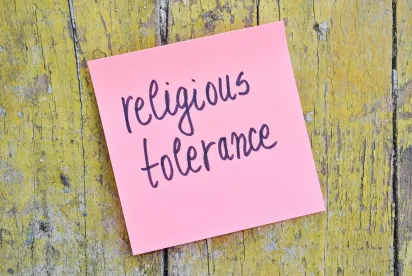On January 8, 2020, the Office of Federal Contract Compliance Programs (“OFCCP”) published an opinion letter responding to an unidentified religious organization’s request for clarification on the “scope of the legal protections for religious liberty in the workplace.” The organization’s request stemmed from its concern that “employees in the technology, education, public, and other sectors may face discrimination at work based on faith-related activities and beliefs.”
Executive Order 11246 applies to federal contractors and subcontractors and, through its equal opportunity clause included in federal contracts, prohibits employment discrimination on a variety of characteristics, including religion. However, the executive order includes an exemption for religious corporations, associations, educational institutions, and societies with respect to the employment of individuals of a certain religion. OFCCP recently finalized regulations expanding the scope of this exemption.
Nonetheless, in its opinion letter, OFCCP noted that a contractor falling under the religious exemption often still has an affirmative obligation to provide religious accommodations and “should evaluate its processes to make sure it is not failing to provide religious accommodations when legally required to do so. If a proposed religious accommodation would impose an undue hardship, the contractor should work with the applicant or employee to attempt to identify a reasonable accommodation that would not impose such a hardship.” Further, the letter advises that contractors “should develop reasonable internal procedures to ensure that their obligation [to provide equal opportunities to members of all religious faiths (or no religious faith) and to provide appropriate accommodations] is being fully implemented.”
The opinion letter addresses six hypothetical scenarios of religious discrimination and assumes in its response that the employer agreed to the requirements of Executive Order 11246 and was not entitled to a religious exemption:
-
Where an applicant or employee suffers an adverse employment action because the employer assumes the individual has religious values that others may find offensive (e.g., wearing a hijab or attending an Orthodox synagogue where seating is separated by sex), that adverse employment action would be unlawful.
-
Where an applicant or employee suffers an adverse employment action because of his or her membership in a religious group that has taken public policy positions that others may find offensive (e.g., supporting or opposing the State of Israel or opposing late-term abortions), that adverse employment action would be unlawful.
-
Where an applicant or employee suffers an adverse employment action for: (1) attending or supporting a synagogue/church-sponsored cause or event (that is part of the individual’s religion); (2) the cause or event is one that others may find offensive (e.g., an anti-war rally, the March for Life, or a rally opposing anti-Semitism); (3) and the attendance takes place during non-work hours, that adverse employment action would be unlawful.
-
Where an employee suffers an adverse employment action for stating, during a company-provided rest break, that he or she has religious views that others may find offensive (e.g., supporting only traditional marriage or, conversely, supporting an expanded definition of the family), that adverse employment action would be unlawful. The opinion letter notes that it assumes for this hypothetical that the employee was not told that the comments were unwelcome and the employee stated his or her view respectfully, in a non-hostile way.
-
Where an applicant or employee suffers an adverse employment action after informing the employer he or she requires a religious accommodation (e.g., the inability to work on religious holy days or the need to have a personal microwave for kosher food), that adverse employment action would be unlawful. Further, the letter notes that “if the employer made no effort to act on the . . . accommodation request, it will likely be unable to demonstrate that the proposed accommodation would actually have posed an undue hardship.”
-
Where an applicant or recently hired employee is let go because he or she requested a religious accommodation (e.g., needing to leave work early in observance of the Sabbath), and was given no opportunity to discuss the requested accommodation with the employer, that termination is unlawful. Although the employer may not be required to provide an accommodation, the opinion letter again notes that if the employer does not act on the request, it will be difficult to show that the accommodation would pose an undue hardship.
These hypotheticals provide clearer guidance on the protections for religiously observant employees and clarify the freedom many employees must be afforded for expressing potentially controversial religious views. However, given the incoming new Administration, it is unclear whether this opinion letter and other developments regarding the religious exemption will be amended or even rescinded. Further, it is unclear whether OFCCP under the new Administration will continue to issue opinion letters. The practice was introduced in 2018, but in subsequent years has resulted in only a handful of opinion letters.
We will continue to report on note-worthy opinion letters as they become available as well as other OFCCP developments.




 />i
/>i

